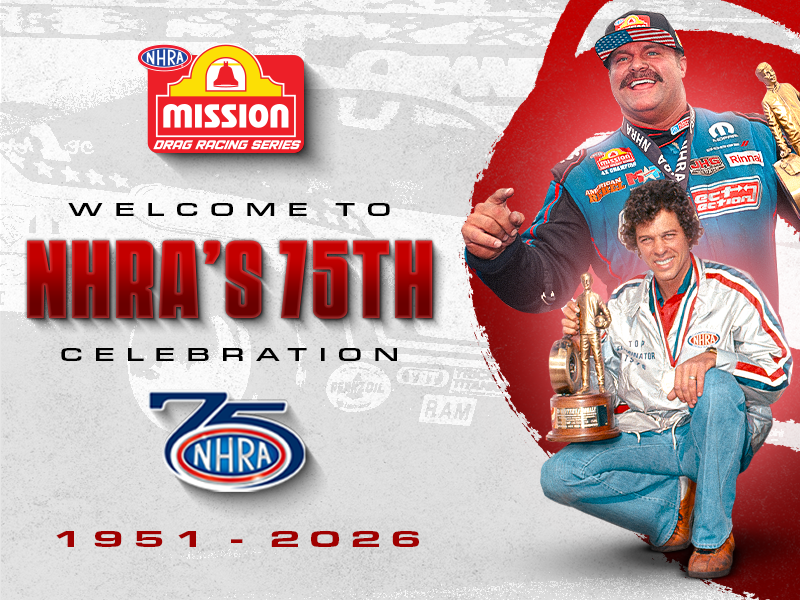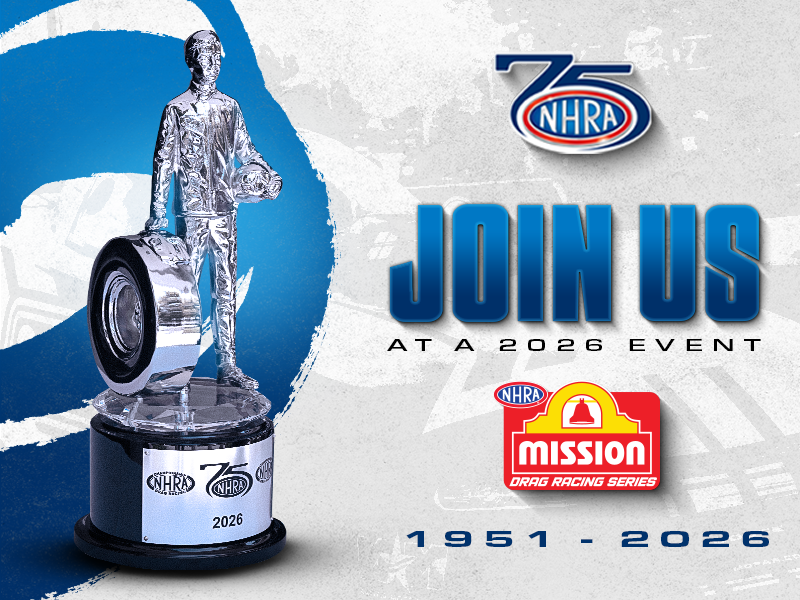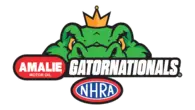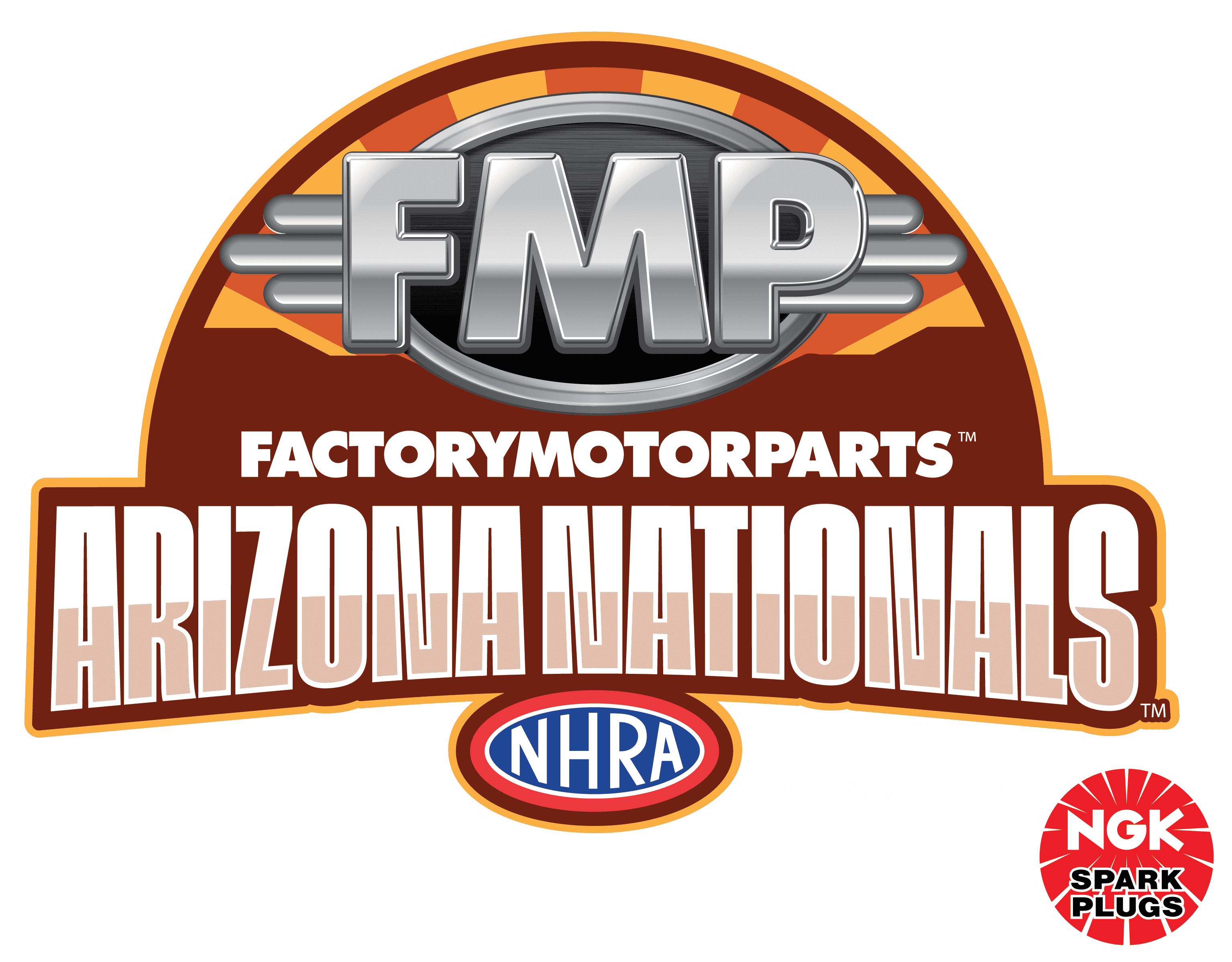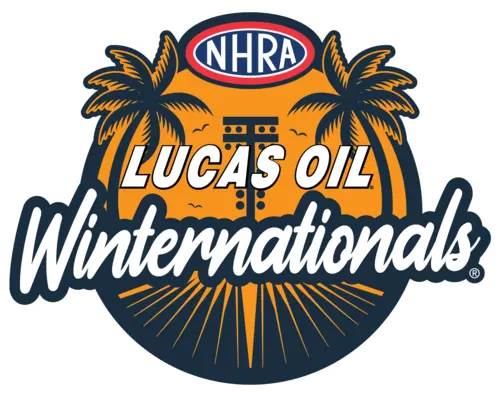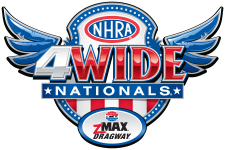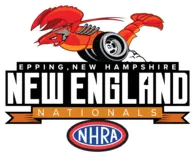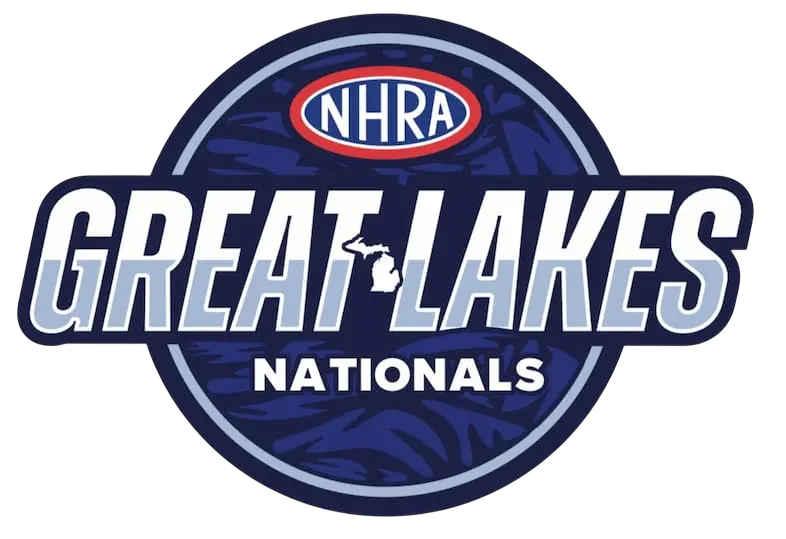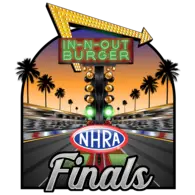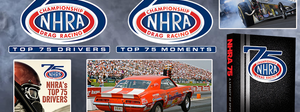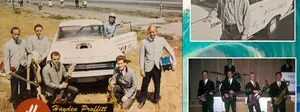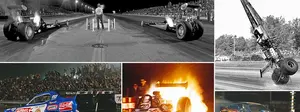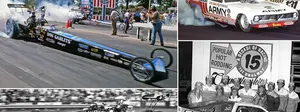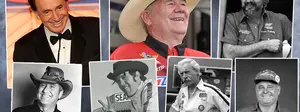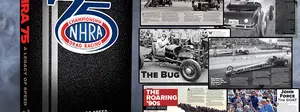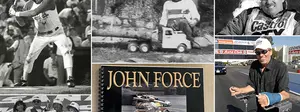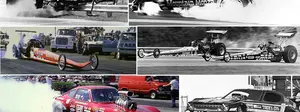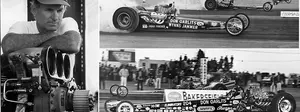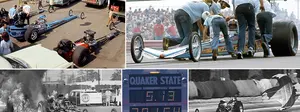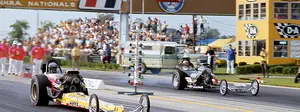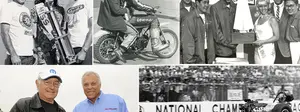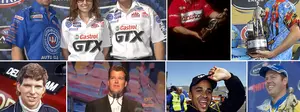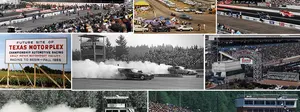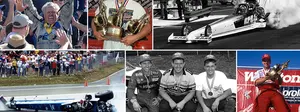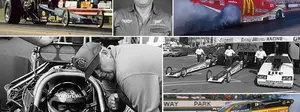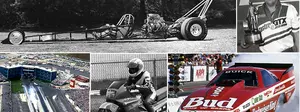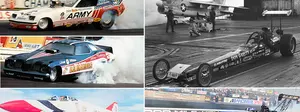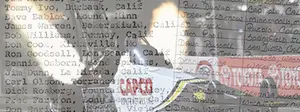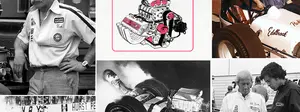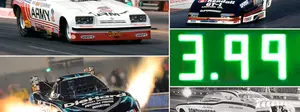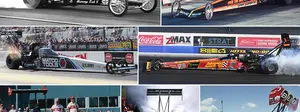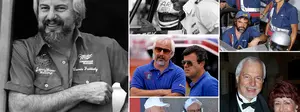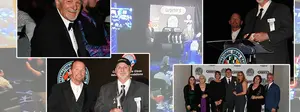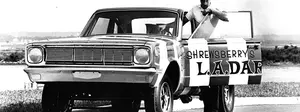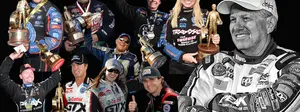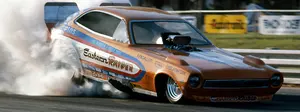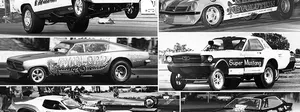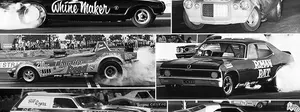The Dual-Fuel Club: 18 drivers who have won in both Top Fuel and Funny Car
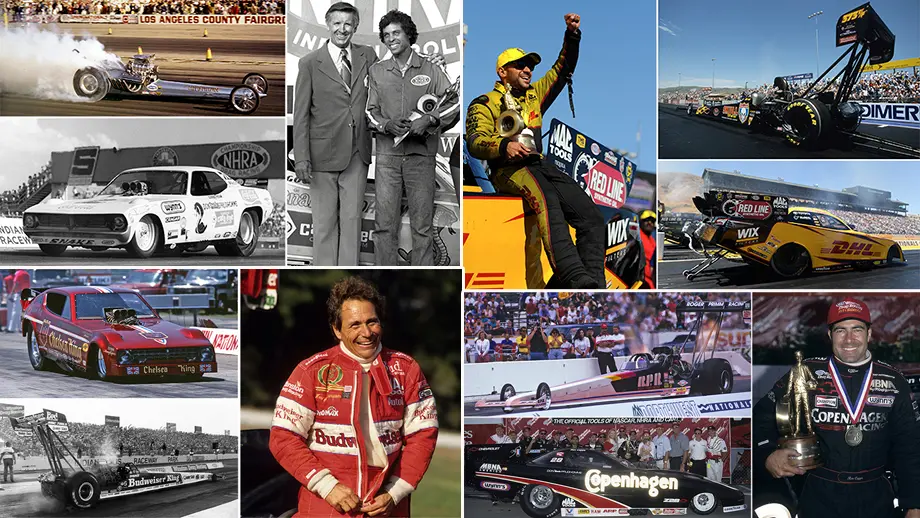
Eighteen Funny Car drivers have done something that even the great John Force never has (and likely never will) do: Win in both Funny Car and Top Fuel. With his Funny Car win at the Summit Racing Equipment NHRA Nationals, Blake Alexander became the latest driver to win in both classes at an NHRA national event.
The short list includes icons of the sport like Don Prudhomme, Ed McCulloch, and Tom McEwen, and Alexander's current contemporaries like Shawn Langdon and J.R. Todd.
Ever since the Funny Car class was introduced in late 1966, the opportunity has been there for a talented multi-disciplined driver to win in both Top Fuel (introduced in 1963) and Funny Car, and in the 57 years since, only 18 drivers have accomplished that feat. These are their stories.
DON PRUDHOMME
Top Fuel (1965 Pomona); Funny Car (1973 Indy)

“The Snake” had already carved a fearsome match-race reputation in Top Fuel in the Greer-Black-Prudhomme car before he won his first national event in Top Fuel at the 1965 Winternationals in Roland Leong’s Hawaiian, capping the day with a final-round victory over Bill Alexander. Prudhomme and Leong would also win Indy that year, as he would again in his own dragster in 1969 and '70.
The 1970 season was Prudhomme’s first in Funny Car with partner Tom McEwen and their new Hot Wheels sponsorship, but the future four-time Funny Car world champion wouldn’t win in his Funny Car until the 1973 U.S. Nationals, nearly four seasons into his floppership. Why? The reason is simple: He hardly ran the Funny Car at national events from 1970-72, driving it at just five of the 26 events that comprised those three seasons.
Prudhomme admits that he hated the Funny Car at first ("we just couldn't figure out how to make it run, and I loved my front-engine dragster") and competed mostly in his various Top Fuelers (the Wynn's Winder and Hot Wheels front-engined cars, the ill-fated wedge, and the “Yellow Feather”), and when he tried to run both cars at the same event, it was an unmitigated disaster, often with both cars losing in round one.
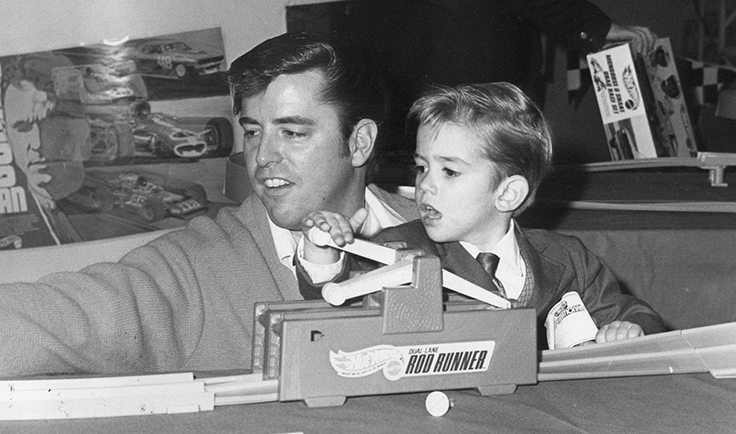
Besides, according to Prudhomme, Mattel thought that the Hot Wheels 'Cuda would get more attention running dozens of mom-and-pop match races across the country than at just the few national events on the schedule, allowing “the Snake" and “Mongoose” to stage in-market promotions like Hot Wheels races with kids across the country, like his future driver, Larry Dixon Jr., seen here with his father in th early 1970s.
1973 was the seminal Funny Car year for Prudhomme, who commissioned John Buttera to build his new Carefree Sugarless Gum-backed Barracuda Funny Car, and the change was immediate and obvious. He didn’t run the car at a national event until June, at the Springnationals, where he was the No. 1 qualifier and went to the semifinals. He qualified No. 1 again at the Summernationals but was upset in round one, which led to Indy, where he again qualified No. 1 and raced past Tom Prock, Richard Tharp, and Leroy Goldstein to face off with two-time defending champ Ed McCulloch, whom he beat, 6.38 to 6.34.
Not only did that make Prudhomme the first to win in both nitro categories, but a feat that would remarkably go unmatched for a decade.
Prudhomme’s best years were still ahead, with four straight championships (1975-78) and 49 total career wins, including nine more in Top Fuel, where he finished his amazing career as it had begun.
MARK OSWALD
Top Fuel (1982 Baton Rouge); Funny Car (1983 Montreal)
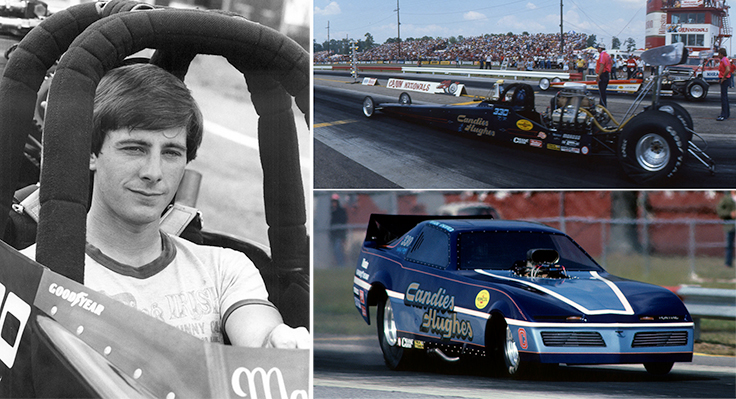
After three formative years in Top Fuel in the Ohio-local sensation that was the Thomas-Oswald-Kattelman entry, Oswald graduated to the big time when he was hired by Paul Candies to drive the vaunted Candies & Hughes dragster in 1982 to replace the often-recalcitrant Richard Tharp, whose wild habits didn’t sit well with straight-laced tuner Leonard Hughes.
The team only won one round in the first three races of 1982 before going the distance over an eight-car field at the Cajun Nationals, capped with a victory over Shirley Muldowney, who would win her third and final championship that season. Oswald would follow with another victory, at the Summernationals, where he famously (and finally) unseated Don Garlits’ 5.63 blast from 1975 for the new national record with a 5.62.
1982 was the Top Fuel swan song for Candies & Hughes as they moved to Funny Car in 1983, bringing Oswald with them in a new Pontiac Trans Am. The team stunningly DNQ’d in its class debut (or re-debut, as Hughes had won two Funny Car titles for them in the early 1970s) at the 1983 Winternationals. They lost in round one of Gatornationals and Southern Nationals then were runners-up at the Cajun Nationals and Springnationals (behind Al Segrini and Raymond Beadle, respectively). The first win finally came in Montreal, where Oswald worked his way past John Force, Ken Veney, and, in the final, Don Prudhomme.
In the shortest span on this list, it only took Oswald 12 races to go from first Top Fuel win to first Funny Car win. Oswald would win 18 times in Funny Car and the world championship in 1984 and today is the co-tuner for three-time Top Fuel world champ Antron Brown.
GENE SNOW
Funny Car (1970 York, Pa.); Top Fuel (1985 Phoenix)

Although “the Snowman’s” first official Funny Car win is recorded as the 1970 Summernationals in its one-year stay at U.S. 30 Dragway in York, Pa., his two previous wins — in Comp and Super Eliminator at the U.S. Nationals in 1966 and ’67, respectively — were, for all intents and purposes, in what was loosely already a Funny Car: an altered-wheelbase Dodge Dart that NHRA clumped into the C/Fuel Dragster class in Comp.
By 1970, Funny Car was a real class, and Snow was in a Logghe-built Dodge Challenger called Rambunctious. The direct-drive machine ran a four-disc clutch and was a stone killer, and ran the class’ first 200-mph pass. After runner-ups behind Larry Reyes at the Winternationals and Leroy Goldstein at the Springnationals in Dallas (where Snow made the 200-mph pass), he qualified No. 1 in York and, after a first-round bye, beat Bruce Larson, Phil Castronovo, and Vic Brown to win the title. He then went on to win the World Finals to be crowned the NHRA world champ and also won the AHRA world championship the same year and, for good measure, also won the postseason NHRA Supernationals in Ontario, Calif.
Snow expanded to a second car with Jake Johnston and even a short-lived Top Fueler with Chip Woodall and wouldn’t win again in Funny Car until the 1974 Springnationals in Columbus. Those subpar seasons and the energy crisis forced Texas gas and oilman Snow out of racing until 1981, when he returned in a Top Fueler, rationalizing that it would be his last stint and that he wanted to do it in the quickest and fastest cars out there.
Snow got his first of three Top Fuel wins at the FallNationals in Phoenix, the penultimate event of the 1985 season, defeating Dick LaHaie in the final.
From 1983 to 1991, Snow finished in the top 10 in nine consecutive seasons and, with Bob Brooks at AFT, pioneered a direct-drive combination for Top Fuel that pretty much set the standard for what every fuel car runs today. At the 1988 Supernationals at Houston Raceway Park, Snow's 4.997 clocking was the first four-second run at an NHRA national event.
FRANK HAWLEY
Funny Car (1982 Gainesville); Top Fuel (1990 Columbus)

After a few years of match-racing with Austin Coil and the Chi-Town Hustler team, they went big-show racing in 1982, and the heretofore unknown Canadian kid won in their second start of the 1982 season, at the Gatornationals, where they stopped Tim Grose in the final. They had stunningly qualified No. 1 and reached the semifinals of the Winternationals, and they’d go on to win the world championship in one of the sport’s rags-to-riches stories and repeat in 1983.
The Chi-Town juggernaut splintered in early 1985, and Hawley opened his now famous drag racing school in Gainesville and didn’t return until 1988-89, when he wheeled Larry Minor’s second Miller dragster to a pair of runner-ups.
The tragic April 1990 accident that ended Darrell Gwynn’s still-ascending driving career put Hawley in the seat of Gwynn’s Gatornationals-winning Coors Extra Gold dragster when it returned to the tour in June, and, in storybook fashion, Ken Veney tuned Hawley to the win, besting Joe Amato in the final. Hawley would win again later that year in Dallas, where he beat homestate favorite Eddie Hill in the final for his ninth and final win.
KENNY BERNSTEIN
Funny Car (1979 Baton Rouge); Top Fuel (1991 PHOENIX)

Bernstein, like Prudhomme, cut his teeth in Top Fuel, but mostly on the regional Southwest Pro Fuel circuits around his native Texas, wheeling rails for the likes of Vance Hunt, the Anderson brothers, the Carroll brothers, and Prentiss Cunningham before making the switch to the growing-in-popularity Funny Cars with a Mercury Cougar and also briefly drove the L.A. Hooker for the late Gene Beaver and was runner-up with partner Ray Alley at the 1973 Winternationals, where their Engine Masters Dodge lost to Don Schumacher.
Frustrated by his lack of success, Bernstein stopped racing after 1973 and went into the restaurant business, developing a string of Chelsea King pubs. The success of that venture brought him back to Funny Car and, after a refresher course driving Beaver’s L.A. Hooker at the ’77 U.S. Nationals in which they were two-and-a half tenths off the bubble and 14th alternate, he debuted his Chelsea King Arrow in Englishtown the following year but mostly struggled with breakage and first-round losses (a No. 1 qualifying spot in Seattle was the outlier).
After a DNQ at the 1979 Winternationals and a first-round exit at the Gatornationals, Bernstein finally reached the winner’s circle at the Cajun Nationals in Baton Rouge, La., working his way through an eight-car field by beating Bob Pickett and Ron Colson to face off with a not-yet-famous John Force in the final. It was Force’s first final and, after Bernstein walloped him, his runner-up would be the first of nine straight bridesmaids.
After four Funny Car championships in the late 1980s, Bernstein joined Prudhomme in a return to Top Fuel in 1990. He reached the final in Denver that year but was turned away by Joe Amato, but in 1991 won his first Top Fuel Wally in Phoenix then won at the U.S. Nationals after Pat Austin broke on the final-round burnout. He’d win 31 times in Top Fuel, along with two more championships — becoming the first driver to win championships in both nitro classes — and finished with 69 career wins and six championships and, of course, made the first 300-mph pass in 1992.
TOM McEWEN
Funny Car (1973 Ontario); Top Fuel (1991 englishtown)
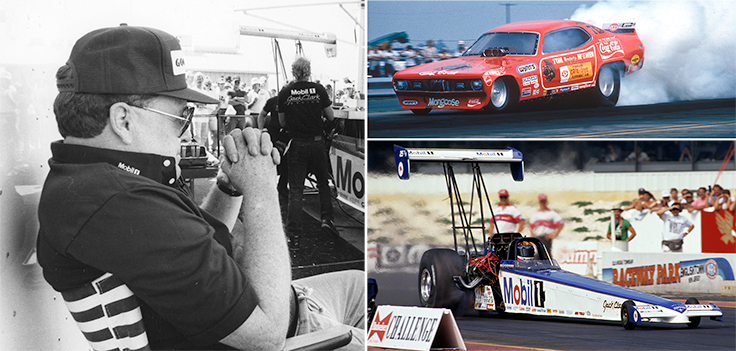
Like his Hot Wheels teammate Prudhomme, “the Mongoose” switched to Funny Cars in 1970 after running Top Fuel throughout the ‘60s with great match-race success but limited success — a pair of Top Eliminator runner-ups at the 1961 and ’62 Winternationals — at national events. But, again, these were the days of single-digit national events on the calendar.
While he and “the Snake” were match-race hits everywhere they went in the early 1970s, McEwen’s national event Funny Car career success was long in coming. He lost in round one at three of the four national events he attended in 1970 and DNQ’d at the fourth, then DNQ’d at three of four he ran in 1971 (including a devastating double DNQ in Top Fuel and Funny Car in Indy), and only ran two national events with his Funny Car in 1972, winning just one round.
Like Prudhomme, a Buttera-built car was commissioned for 1973, but his performance didn’t improve as he DNQ’d in Pomona and Indy (again), then it looked like his season ended with a DNQ at the Supernationals. But when No. 6 qualifier Bobby Rowe had a big fire in qualifying and hit the retaining wall of the oval, McEwen got in as an alternate and took full advantage, beating Dave Condit, defending event champ Jim Dunn, and Jim Nicoll to reach the final. His opponent should have been Dale Emery in the JEGS Camaro, but he had blown the body off in defeating Prudhomme in the semi’s, so McEwen got a solo pass to his first win.
McEwen would add three more Funny Car wins — most memorably, his 1978 final-round victory over Prudhomme in Indy — but left the tour after the 1988 season and spent the next few years driving his popular ’57 Chevy Funny Car in exhibitions before former baseball star Jack Clark lured him back in 1991 with a seat in his new Mobil 1-sponsored dragster, and McEwen promptly won the Summernationals, beating tire-smoking Lori Johns for his fifth and final career win. The 18-year span between the two first nitro wins is the longest on our list.
ED McCULLOCH
Funny Car (1971 Indy); Top Fuel (1992 Indy)

It’s probably not surprising that “the Ace," whose six U.S. Nationals wins rank him high in the nitro ranks, had both of his breakthrough moments in Indy. McCulloch’s first Indy win — heck, his first NHRA win — came in 1971 with partner Art Whipple a year after their beautiful national-record-setting Duster burned to the ground inside the trailer on the way to Indy. McCulloch qualified their new Woody Gilmore-built Barracuda No. 2 behind Henry Harrison and defeated Sammy Miller, Jim Dunn, Connie Kalitta, and, in the final, young Dale Pulde, who rode out a nasty fire in Mickey Thompson’s Pinto. McCulloch won four races in 1972 in his Revellution Duster, including Indy again, then went eight years (and five runner-ups) without a win before scoring again, in Indy again, in the Super Shops Arrow. “The Ace" was on the sidelines from 1981 until 1984 when Larry Minor came calling with the Miller Lite deal.
McCulloch won 12 more times in Larry Minor’s floppers — including Indy again in 1988 and ’90 — before returning to his Top Fuel roots by switching rides with new Team Minor teammate Cruz Pedregon and taking over the McDonald’s Top Fueler, in which he won his sixth and final Indy and joined the dual-fuel club with a final-round victory over Doug Herbert.
MIKE DUNN
Funny Car (1981 Fremont); Top Fuel (1993 Denver)
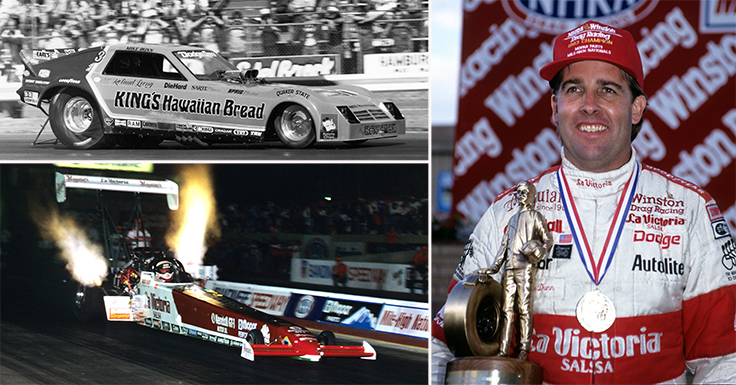
Dunn had worked as a crewmember on Roland Leong’s Hawaiian since the summer of 1977, the same year he had earned his nitro license in his dad’s car and had driven for Bill Schifsky in 1980. When Ron Colson and Leong decided to part ways after the 1980 season, Dunn stepped into the King’s Hawaiian Bread Dodge Omni and won the Golden Gate Nationals in Fremont, Calif., in late 1981, besting Gary Burgin in the final. Dunn left Leong at the end of 1983 and enjoyed several great years driving Joe Pisano’s very fast Olds Cutlass and partnered with his dad, Jim, and Ed Abel in the early 1990s with a Funny Car sponsored by Snickers, racing to nine more Funny Car wins along the way.
Dunn moved into Top Fuel, driving for former MLB star Jack Clark in 1992, and then moved on to drive for Darrell Gwynn in 1993 after Mike Brotherton left the team. Dunn drove the La Victoria Salsa entry to victory at the Mile-High Nationals that year, capping his race-day run with a victory over Doug Herbert. With Ken Veney tuning, Dunn continued to win in Gwynn’s car up through 2001, finishing with 12 total Top Fuel wins to go with his 10 Funny Car titles.
SCOTT KALITTA
Funny Car (1989 Houston); Top Fuel (1993 Topeka)
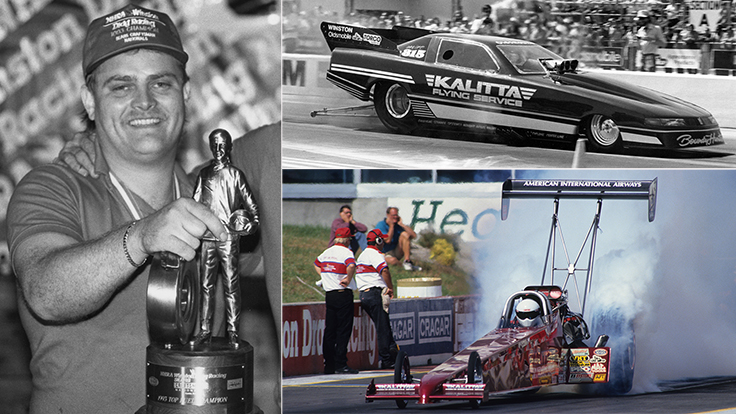
The son of the “Bounty Hunter” may have had his greatest successes in Top Fuel — two world championships and 17 national event wins — but deep down, I always felt he was a Funny Car driver at heart, and it was in Funny Car where he scored his first win and his only win in the class, at the 1989 SuperNationals, defeating the man who would end the year as the world champ, Bruce Larson, in the final round in Houston.
Kalitta had initially started his career in dragsters, running in the Top Alcohol Dragster class in the late 1970s and early 1980s, then joined his father in Top Fuel for a few years in the early ‘80s before switching to Funny Car, but he was back in the Top Fueler full time in 1991. It took him a couple of years to fully blossom, but he opened 1993 with three semifinal finishes in the first six races then a red-light runner-up to Eddie Hill at the spring event in Topeka. He also became the fourth member of the Slick 50 300 MPH Club at the Gatornationals. When the NHRA returned to Topeka in the fall, Kalitta was ready and raced back to the final round, where he beat his good friend, Cory McClenathan, for the win. At the event, he also ran 38.64 mph, which at the time was the fastest speed in history.
Kalitta would win world championships in 1994 and ’95 and win his final event, in Top Fuel, at the 2005 Chicago event. He returned to Funny Car in 2006, and we lost him a few years later in a terrible top-end crash in Englishtown.
JIM HEAD
Funny Car (1984 Indy); Top Fuel (1996 Topeka)

After a couple of years in Comp and Alcohol Dragster, Jim Head made the leap into Top Fuel in 1980 and, in his first outing — at the U.S. Nationals of all places — he won three rounds before being knocked out by Jeb Allen in the semifinals (Indy’s last 32-car field). It was all downhill from there as over the next 18 races through the end of 1983, he won just four rounds and DNQ’d eight times. Now, if you know Jim Head, if he’s not having fun, he’s not doing it, so he threw in the towel on Top Fuel and surprised everyone by going Funny Car racing in 1984.
Head’s fuel-flopper flip-flop worked amazingly well. In his second race in the class, he was runner-up behind Billy Meyer at the Cajun Nationals, and six races later, won the U.S. Nationals, running steady 5.90s to beat the highly sponsored brewery-backed cars of Ed McCulloch (Miller), Tom McEwen (Coors), and Kenny Bernstein (Budweiser) in the final three rounds, leading to one of NHRA National Dragster’s most groan-inducing headlines: “Head’s 5.90 hops leave beer cars flat.” (Head’s conquest of the Bud King might have been bigger news had he not had to share the spotlight with Don Garlits’ rags-to-riches Indy comeback win.) Head collected two more Funny Car wins in 1985 before the well ran dry, though he did remain on the cutting edge with his swoopy Olds-bodied answer to Kenny Bernstein’s wild “Batmobile” Buick and the introduction of a high-gear-only, multi-stage clutch combination in 1988.
He returned to Top Fuel in 1990 with a car referred to as “the noodle car” for its flexible chassis design and even tested a streamliner rear-body shell but averaged just about five round-wins a season through 1995. During this time, the great innovator became friends with one of the sport’s other great minds, Alan Johnson. After Blaine Johnson’s stunning death at the 1996 U.S. Nationals, Alan assisted Head at the next event, in Topeka, got him qualified, then had to fly home to California for the impending birth of his daughter but stayed in touch via telephone with Head’s tuner, Johnny Davis, to guide them to an emotional victory, capped by a final-round win against Kenny Bernstein. In 1997, Head would also add his name to the short list of drivers to win Indy in both classes (Don Prudhomme, Ed McCulloch, and Kenny Bernstein) with a Top Fuel win at the Big Go, then scored his final win later that year in Memphis, Tenn.
RON CAPPS
Top Fuel (1995 Seattle); Funny Car (1997 St. Louis)
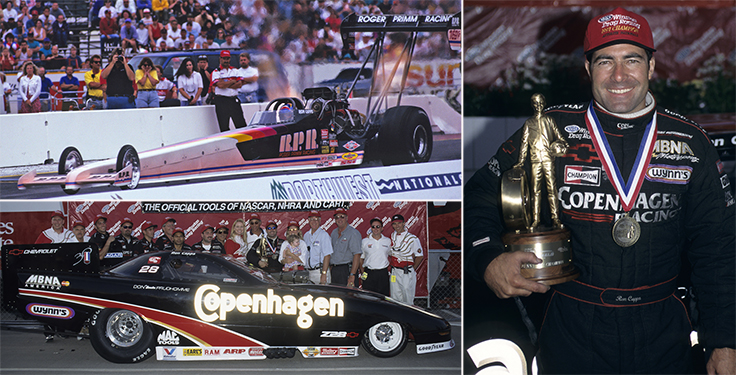
The future three-time Funny Car world champ got his start in Top Fuel in 1995, driving for Nevada casino owner Roger Primm and was runner-up in Atlanta in just his fourth start and won in Seattle in his ninth start, reversing the outcome of the Southern Nationals final by defeating Cory McClenathan at the Northwest Nationals. Capps won just two rounds and DNQ’d twice over the next 11 races through mid-1996 before the team called it quits.
Capps wasn’t on the sidelines long as he had caught the eye of Don Prudhomme, who hired him to drive his Copenhagen Camaro Funny Car in 1997. It took just 11 starts to add his first of what has become 73 career Funny Car wins when he defeated Cruz Pedregon in the final round in the inaugural NHRA national event in St. Louis. Capps, of course, would go on to drive for Don Schumacher Racing before starting his own team in 2022 and collected three world championships along the way. His 73 wins rank him second only behind John Force in Funny Car history, and he’s one win away from becoming just the 11th driver in NHRA history to collect 75 wins.
TOMMY JOHNSON JR.
Top Fuel (1993); Funny Car (1999)

After making the leap from Top Alcohol Funny Car, where he had won at the 1988 Springnationals, to Top Fuel in 1990, the family-run dragster made T.J. the surprise 14th member of the Cragar 4-Second Club with a 4.964 in Topeka, and three seasons later he scored his first Top Fuel win at the Northwest Nationals in Seattle, besting Cory McClenathan in the final. The team added a second win in Memphis in 1994, but the luck and finances eventually dried up, and after partial seasons in 1996 and ’97, Johnson sat out the 1998 season before being hired in 1999 to drive the Interstate Batteries Pontiac Funny Car of Joe Gibbs.
Johnson won in Reading that year to join the double-nitro club, beating Ron Capps in the final round. After driving for legends Don Prudhomme and Kenny Bernstein, Johnson would join Don Schumacher Racing in 2013 and win 20 more times in Funny Car, including his final victory in a memorable pinch hit for COVID-19-sidelined Matt Hagan in 2021 before the vast DSR stable was partially dismantled.
GARY SCELZI
Top Fuel (1997 Pomona 1); Funny Car (2003 Sonoma)
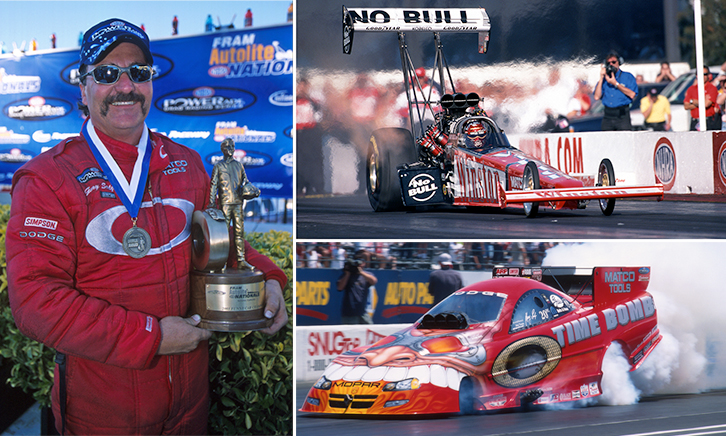
Drag racing’s “Wild Thing” collected wins in all four supercharged dragster and Funny Car classes, starting with a trio of wins in Top Alcohol Dragster in the mid-1980s and three more in Alcohol Funny Car in the early 1990s before adding Top Fuel (25 wins) and Funny Car (12 victories) to his collection in a career that lasted into the late-2000s.
Scelzi was Alan Johnson’s handpicked driver to replace his late brother Blaine in the family’s Top Fueler following Blaine’s tragic passing during a qualifying run the previous year at the U.S. Nationals. With Winston backing the comeback, Scelzi and Johnson wasted no time, besting Joe Amato in the final of the Winternationals to kick off 1997 and the first of three championships and 25 wins over the following four seasons.
In 2002, Scelzi made the move to Funny Car with Johnson after the Winston deal ended as part of the tobacco master settlement, then joined the Don Schumacher Racing empire in 2003 at the wheel of its Oakley sunglasses-backed Dodge, and quickly won in Sonoma, where he bested Dean Skuza in the final. He’d go on to win 11 more times in Funny Car for a career total of 43 wins. His world championship in 2005 made him just the second driver behind Bernstein to win season titles in both Top Fuel and Funny Car.
MELANIE TROXEL
Top Fuel (2006 Pomona 1); Funny Car (2008 Bristol)
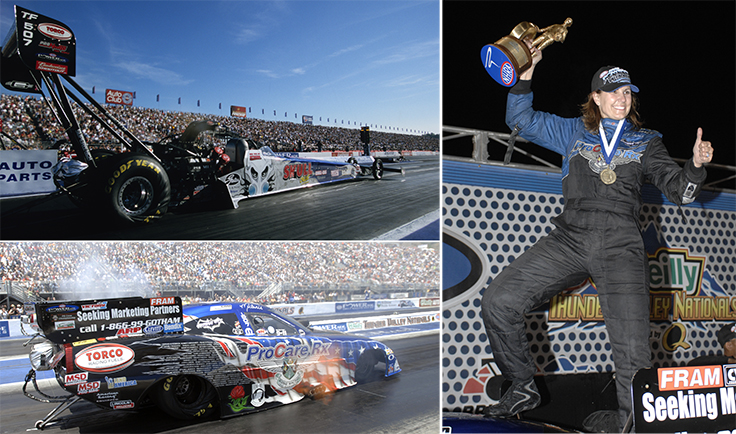
Troxel followed her world championship-winning father Mike into the Top Alcohol Dragster class, where she won twice before launching a nitro career in the early 2000s. She joined the Don Schumacher Racing armada full time in 2006 and defeated David Baca in the final round at the season-opening Winternationals. She went to a record five straight finals to start the season (adding runner-ups in Gainesville, Phoenix, and Houston and a win in Las Vegas) and, as a result, became the first female in 40 years to be honored by the Driver of the Year Foundation as its First Quarter winner. She went on to be nominated for two ESPYs (Best Driver, Best Female Athlete) and was named Sportswoman of the Year by Billie Jean King’s Women’s Sports Foundation.
Troxel went Funny Car racing in 2008 behind the wheel of Mike Ashley’s ProCare RX Dodge and made even more history. Two races after becoming just the second female to win in Funny Car (beat to the milestone two races earlier by Ashley Force in Atlanta), Troxel won in Bristol, stopping Mike Neff in the late-night finale. Two races later, she became the first female to qualify No. 1 in both nitro categories when she grabbed the pole at the Chicago event that year. Troxel later went on to add two Pro Mod wins to her amazingly diverse résumé.
DEL WORSHAM
Funny Car (1991 Atlanta); Top Fuel (2011 Gainesville)
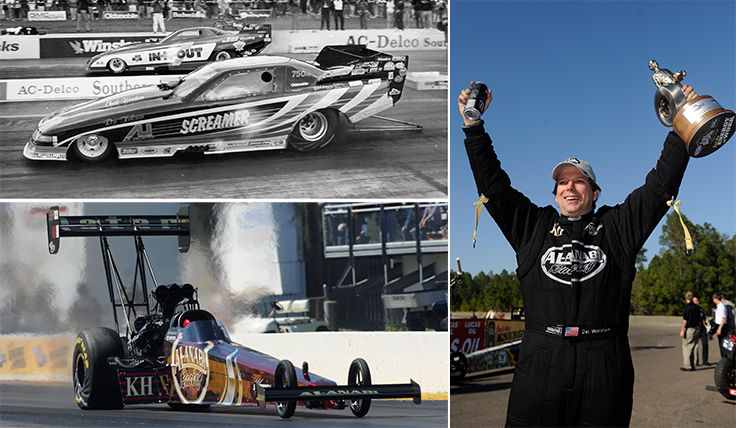
After making his debut at the 1990 season finale at his hometown Pomona race, it only took five races into the 1991 campaign for the 21-year-old second-generation Funny Car addict to win his first event in the family-owned car tuned by his father, Chuck, at the Southern Nationals in 1991, his first of 25 in what would be his first of two stints in Funny Car and leading to what would be rookie of the year honors that season.
Although he would continue to race in Funny Car on an almost full-time basis through 2010, he also took the occasion to drive Roger Primm’s Top Fueler — the car in which fellow future Funny Car world champ Ron Capps would get his start a year later — in the 1993 and ‘94 seasons.
In 2009-10, he wheeled the Alan Johnson-guided Al-Anabi Funny Car, then transitioned into the team’s Top Fueler in 2011, and won in Gainesville, in just his second race of the season, stopping Tony Schumacher in the final for his first of eight career Top Fuel wins and membership in the dual-fuel win club.
After wrenching Alexis DeJoria in 2012, he returned to Funny Car driving for Kalitta Motorsports in 2013 and won six more times and the 2015 championship in the DHL Toyota to make him the third and most recent driver to win championships in both nitro classes. He drove through 2016 and now again is tuning for DeJoria.
J.R. TODD
Top Fuel (2006 Denver); Funny Car (2017 Sonoma)

Todd’s stunning final-round upset over Tony Schumacher at the 2006 Mile-High Nationals in Dexter Tuttle’s Skull Shine dragster catapulted him into national recognition and his first of nine Top Fuel victories, three of which came over Schumacher, the class’ all-time winner, during a run that lasted until 2016 and included stints with the Lucas family, Rick Henkelman and David Baca, and Bob Vandergriff Jr., but went through a six-season drought (2008-14) until he scored, again in Denver, after joining Kalitta Motorsports that season.
Todd switched to Kalitta’s DHL Funny Car in 2017, replacing Del Worsham, and it only took him 15 races, until the Sonoma event, to get his first Funny Car win, besting Tim Wilkerson in the final. In the process, Todd became just the second driver, behind Prudhomme, to win in both classes in Sonoma and has added nine more Funny Car wins since then.
SHAWN LANGDON
Top Fuel (Charlotte 2 2012); Funny Car (2019 Charlotte 1)
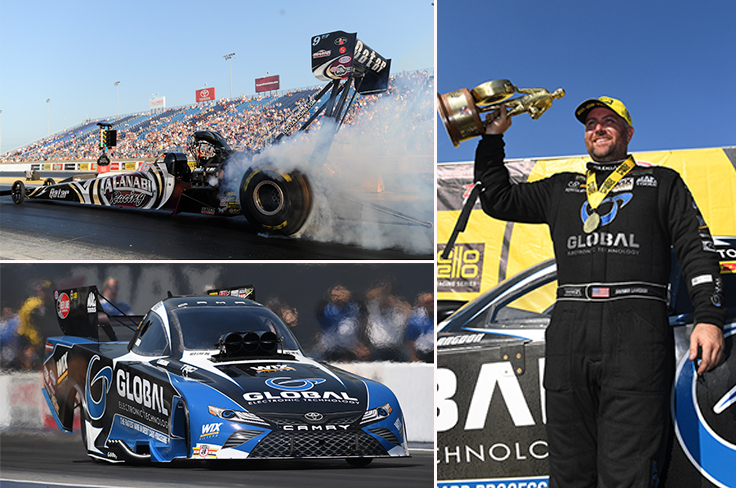
Langdon had already had two Sportsman world championships, seven Super-class wins, and a Jr. Dragster title before he ever went nitro racing with the Lucas family in 2009 and collected his first win at the fall Charlotte event in 2012 in the Alan Johnson-tuned Al-Anabi dragster, besting Tony Schumacher in the final. In 2013, he added a Top Fuel world championship to his collection.
Langdon moved to the Don Schumacher Racing camp in 2015 and ’16 then joined Kalitta Motorsports in 2017, wheeling a third dragster for legendary team owner Connie Kalitta. A year after Kalitta teammate J.R. Todd moved from Top Fuel to Funny Car (and joined the dual-nitro wins club himself), Langdon joined him in the flopper ranks in 2018 but went the bulk of two frustrating seasons before his first of two Funny Car wins, which came at the four-wide event back in Charlotte in 2019, where his Del Worsham- and Nicky Boninfante-tuned Global Electronic Technology Toyota outran a trio of world champs in Robert Hight, John Force, and Matt Hagan.
Langdon returned to Top Fuel in 2020 and scored his 15th and most recent Top Fuel win at the U.S. Nationals, which he had previously won in Super Gas (2010) and Top Fuel (2013).
BLAKE ALEXANDER
Top Fuel (2018 Norwalk); Funny Car (2023 Norwalk)

Alexander, who spent years dedicating himself to a Funny Car career, hustling and bustling for sponsors to keep his dream alive, ironically scored his first two NHRA wins in Top Fuel, but the world is right again as Alexander finally got his elusive first win in Funny Car in Norwalk, where five years earlier he scored his breakthrough Top Fuel win with a final-round defeat of Terry McMillen.
After five partial seasons (2012-16) driving in Funny Car for legendary nitro tuner Paul Smith, and going as far as driving with a broken leg in Englishtown that final season (he broke his leg in an off-track incident and had to cut his cast off to fit it into his fireboot), he reinvented himself as a Top Fuel driver in 2017, bringing his cherished Pronto Auto Service Center backing and licensing first in Del Worsham’s car and then driving for Bob Vandergriff Jr. beginning in 2018, leading up to that first win in Norwalk and a second not long after in Sonoma.
He returned to Funny Car in early 2019 after purchasing Brian Stewart’s operation and got to know his current team owner, Jim Head, when he subbed for Head driver Jonnie Lindberg in Bristol later that year. Head liked what he saw and, at the end of 2019, he hired Alexander for the 2020 season.
Alexander got close with a Funny Car runner-up in Gainesville last season but this year started out rough until a test session before the Norwalk race turned things around and carried Alexander into the same dual-nitro club that Head had joined more than a quarter-century earlier.
Phil Burgess can be reached at pburgess@nhra.com
Hundreds of more articles like this can be found in the DRAGSTER INSIDER COLUMN ARCHIVE
Or try the Random Dragster Insider story generator



